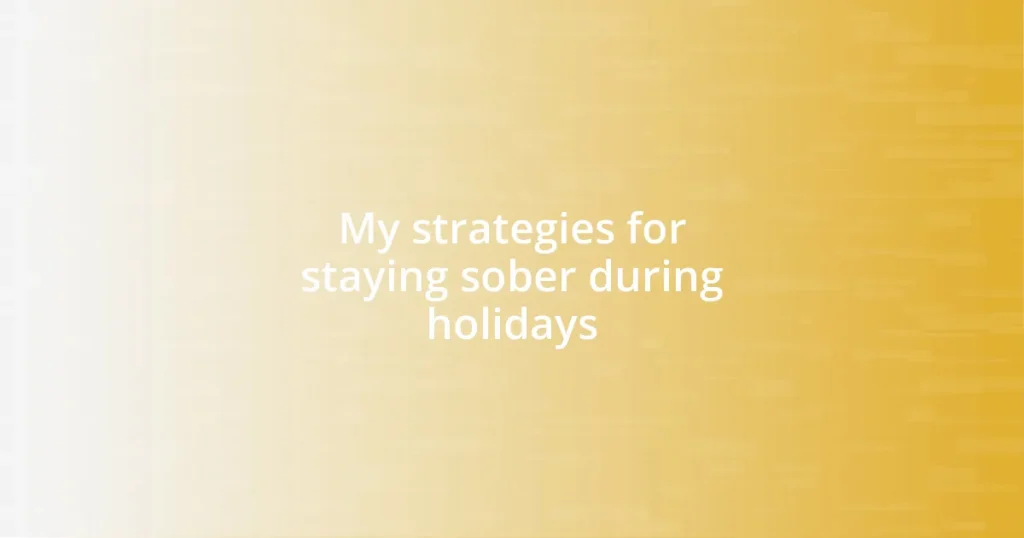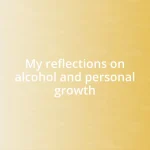Key takeaways:
- Planning ahead for holiday events and identifying potential triggers are essential strategies to maintain sobriety.
- Creating a supportive network of friends and engaging in sober activities can significantly help during challenging times.
- Setting personal boundaries and communicating sobriety goals with others fosters a more accepting environment.
- Reflecting on progress and celebrating milestones reinforces commitment to sobriety and boosts confidence.
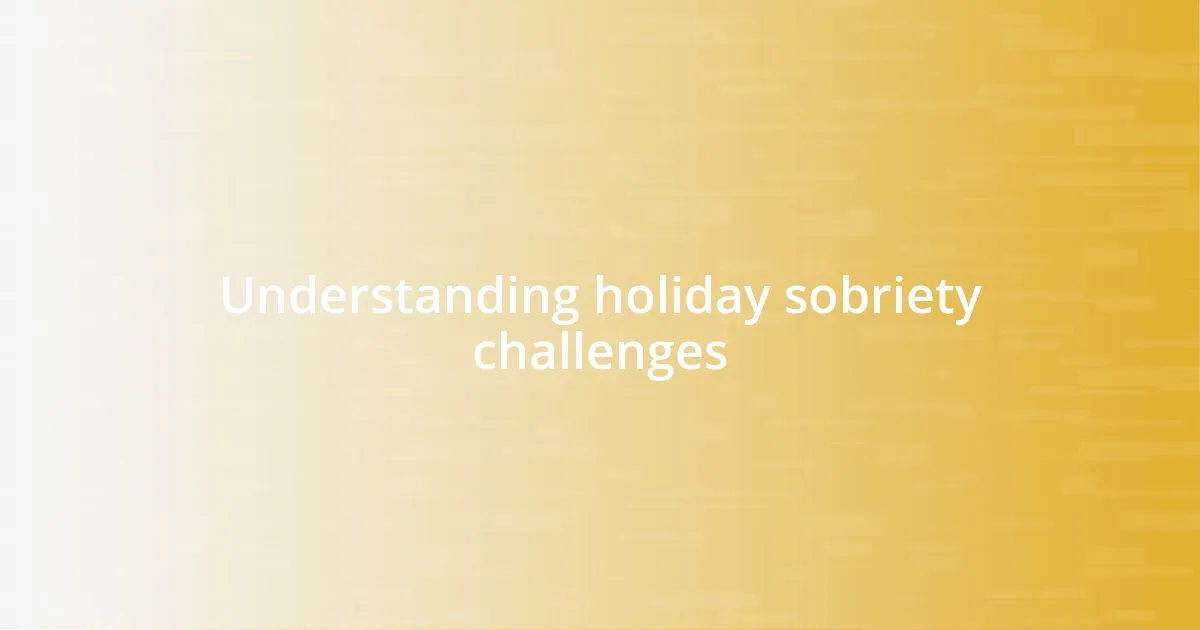
Understanding holiday sobriety challenges
During the holidays, the atmosphere can feel intoxicating in ways beyond alcohol. I remember walking into a festive gathering, and the warm glow of lights and laughter surrounded me, almost like a familiar embrace. It hit me then how easily one can mistake this enchantment for a need to drink, raising the question: Is it truly the celebrations that cheer us, or is it the drinks that we associate with joy?
Family gatherings can be particularly challenging; I’ve faced moments where conversations veered into uncomfortable territory. I found myself craving a drink not just to negate my discomfort, but to feel part of the group again. It’s tough, isn’t it? The pressure to fit in can be overwhelming, making it vital to prepare ourselves mentally for those triggering moments.
Amidst the joy and chaos, there’s a unique loneliness that can creep in when you’re choosing sobriety. I’ve sat through perfectly pleasant holidays while my mind raced, wondering if I was missing out. This struggle really forced me to confront a critical truth: Reminding ourselves why we chose this path can be the lifeline we need in those emotionally charged situations.
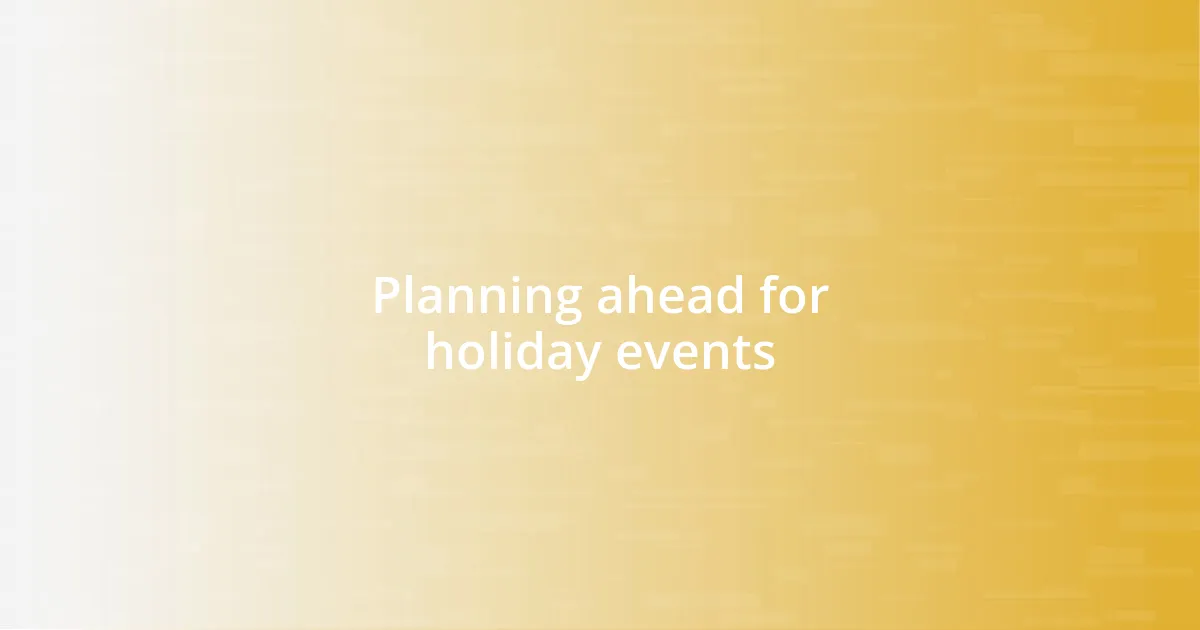
Planning ahead for holiday events
Planning ahead for holiday events is essential for maintaining sobriety. I often find it helpful to map out my social calendar in advance. For instance, I once faced a series of holiday parties in one week. The realization hit me that without a plan, I could easily find myself caught off guard. Knowing which events might be more challenging allowed me to equip myself with coping strategies, like bringing a supportive friend or having a list of go-to non-alcoholic drinks.
In another instance, I volunteered to host a small gathering. It not only gave me control over the environment but also shifted my focus from drinking to creating an inviting experience for my guests. That sense of ownership made me feel empowered instead of anxious about what temptations might arise. I learned that establishing my own boundaries in advance helped mitigate those feelings of vulnerability.
It’s crucial to communicate your sobriety goals to friends and family ahead of time. I remember sharing my journey during a family dinner, which surprised me by garnering a lot of support. This transparency made it easier for everyone to understand my choices and helped set the tone for future gatherings. With that clarity, I felt less pressure and more acceptance, allowing me to truly enjoy the festivities without feeling isolated.
| Before the Event | During the Event |
|---|---|
| Map out your social calendar | Communicate sobriety goals |
| Identify potential triggers | Engage with non-drinkers |
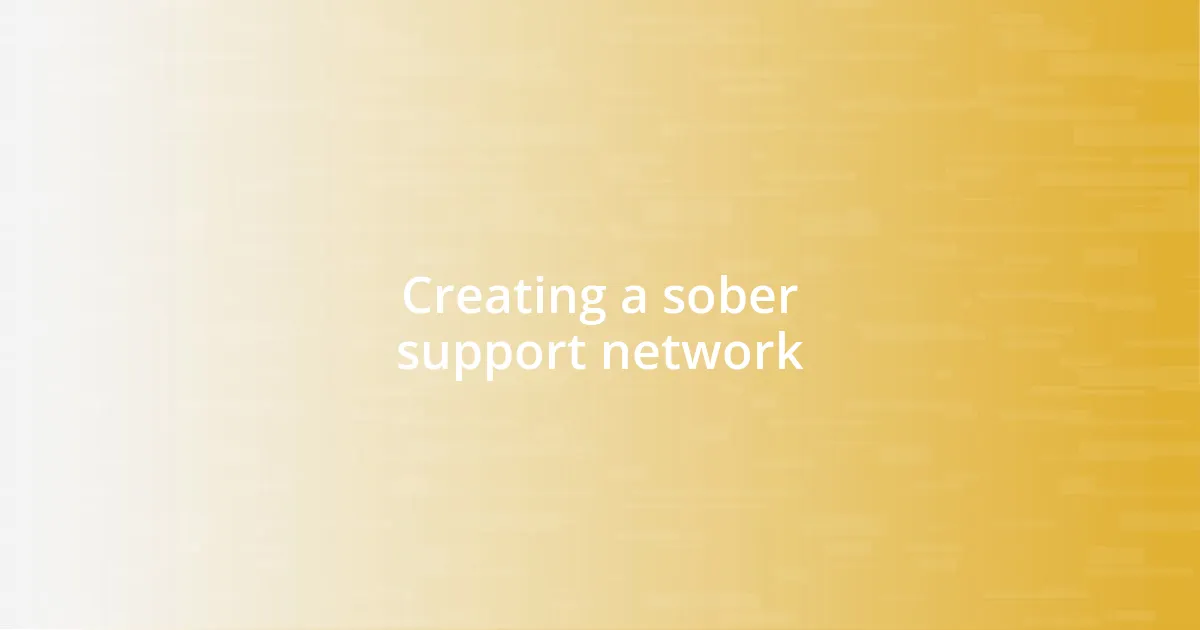
Creating a sober support network
Creating a sober support network is crucial during the holiday season. I remember feeling a rush of relief when I first reached out to a few close friends who understood my journey. Their support became my anchor, especially during challenging moments. It’s powerful to have people in your corner who can remind you of your strength and help steer you back on course when you’re feeling vulnerable.
Here are some key elements to consider when building your support network:
- Identify your safe people: Focus on friends or family who respect your sobriety and uplift you.
- Engage in sober activities: Plan outings that don’t revolve around drinking, like hiking or movie nights, to strengthen your bonds.
- Use technology: Join online forums or support groups where you can connect with others who share your experiences, especially if in-person support is limited.
- Be open about your needs: Don’t hesitate to express when you’re feeling overwhelmed; true friends will appreciate your honesty and strive to accommodate.
- Create a buddy system: Partner with someone you trust and agree to watch out for one another during social gatherings.
Having this network can make a significant difference in your ability to navigate the often tumultuous holiday landscape. When I embraced this system of support, I not only found strength in my relationships, but I also gained confidence in my journey.
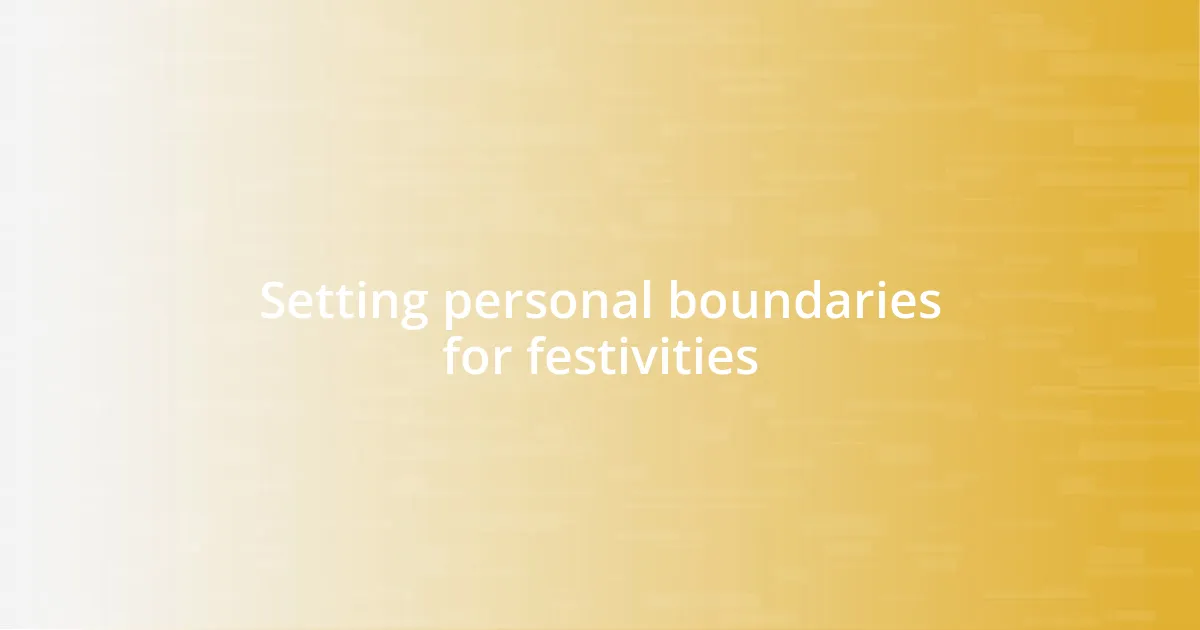
Setting personal boundaries for festivities
Setting personal boundaries during the holidays has been a game changer for me. I remember attending a party where the atmosphere was tempting, and I felt pressure to partake. But I set clear limits for myself; I promised to leave after an hour if I started feeling overwhelmed. That simple decision empowered me to enjoy the time without losing sight of my goals.
A practical strategy I’ve adopted is designating a “safe zone” at gatherings. For instance, I once positioned myself near the snack table, engaging in light conversations while holding my sparkling water. This small boundary made me feel more in control since I was actively participating without being drawn into drinking. Have you ever thought about where you feel safest at events? Finding that spot can drastically change your experience.
Talking beforehand with the hosts about my sobriety made a significant difference too. I shared my journey with a friend who was throwing a holiday bash, and she was incredibly supportive. She even prepared a few non-alcoholic options for me! This not only reinforced my commitment but also ensured I felt welcomed and accepted. Setting personal boundaries is much easier when you have support and understanding around you, don’t you think?
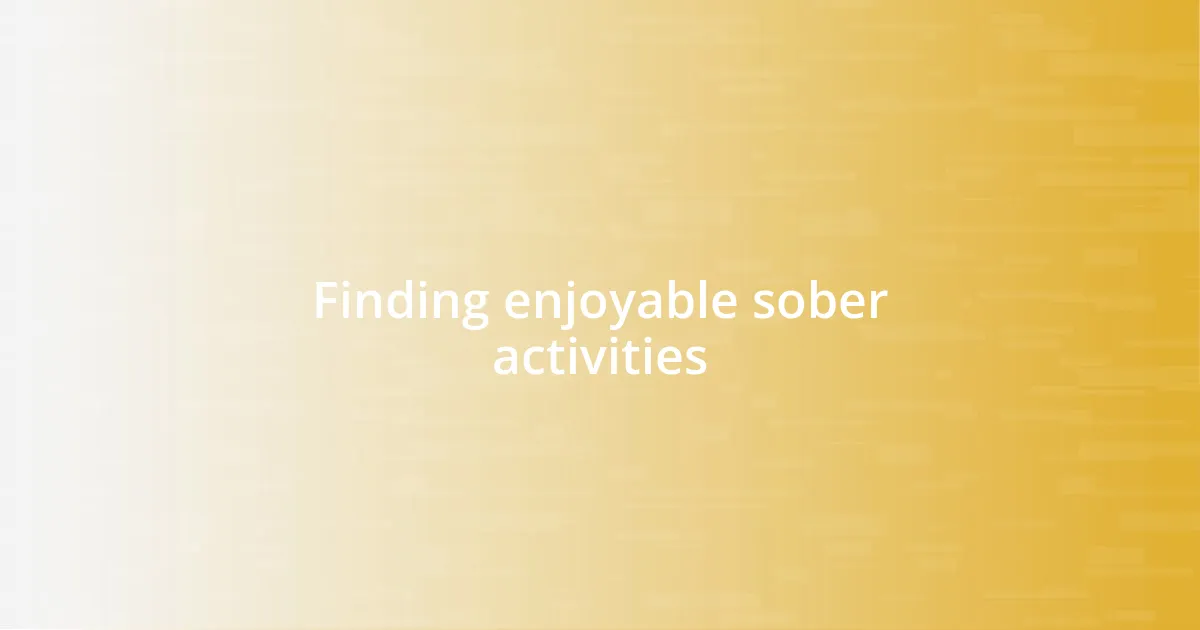
Finding enjoyable sober activities
Finding enjoyable sober activities during the holidays can be a delightful challenge, but I’ve discovered some gems that truly keep me engaged and fulfilled. One Christmas, I organized a game night with my friends, complete with board games and homemade snacks. The laughter and friendly competition made me forget all about the pressure of drinking—plus, it was great to introduce my non-drinking friends to the fun of a good old-fashioned game night!
I also find joy in volunteering during the festive season. Last year, I spent my New Year’s Eve serving meals at a local shelter. As the clock struck midnight, instead of feeling like I was missing out, I was surrounded by incredible people who were focused on giving back. That sense of purpose filled my heart, and it reinforced the idea that making a positive impact is one of the most rewarding ways to spend the holidays. What activities could you do this season that would leave you feeling fulfilled and connected?
Exploring creative pursuits can be another enriching way to stay sober while enjoying the festivities. I took up painting a few years ago, and it’s been a wonderful escape during the holiday season. As I gathered my brushes and paints, I found myself lost in creativity rather than the stress of social pressures. Have you ever thought about exploring an art class or diving into a DIY project? It’s liberating to pour your emotions onto a canvas, and you never know—your masterpiece might just become a cherished holiday keepsake!
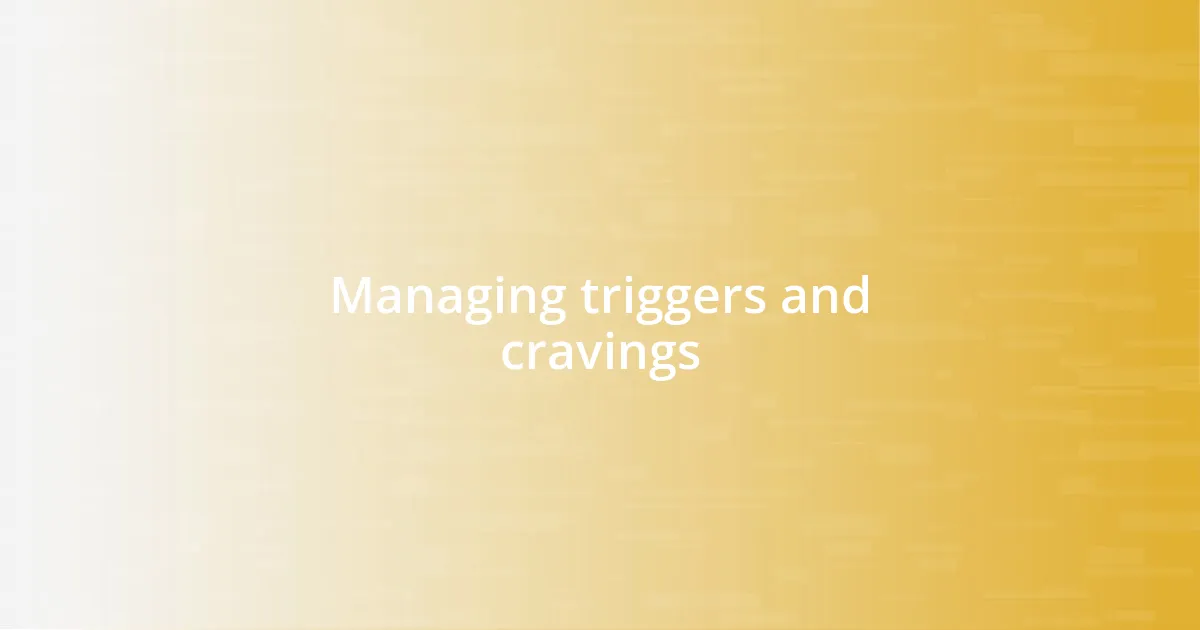
Managing triggers and cravings
Managing triggers during the holidays is crucial to maintaining my sobriety. I recall a gathering where old friends were sharing stories over drinks, and I felt a familiar twinge of craving. Instead of succumbing, I focused on the present moment, reminding myself why I chose this path. It was a subtle but powerful shift in perspective. Have you ever noticed how powerful your thoughts can be when a craving hits?
Cravings can strike unexpectedly, especially in festive settings. I’ve learned to carry a small toolkit in my bag—things like mints, herbal teas, or even a stress ball. One night, while surrounded by the festive buzz, I toyed with my stress ball and sipped my favorite tea. It not only distracted me but helped me refocus my energy on something tangible instead of the drinks around me. Isn’t it amazing how simple objects can ground us in challenging moments?
Sometimes, it’s the emotional triggers that catch me off guard. I remember a holiday party where I felt a wave of nostalgia that made me crave past comforts. In that moment, I reached out to a fellow sober friend and shared what I was feeling. It was comforting to articulate my emotions, turning a potentially overwhelming experience into a moment of connection and support. Have you tried talking it out when cravings hit? It’s often the conversation itself that offers clarity and relief.
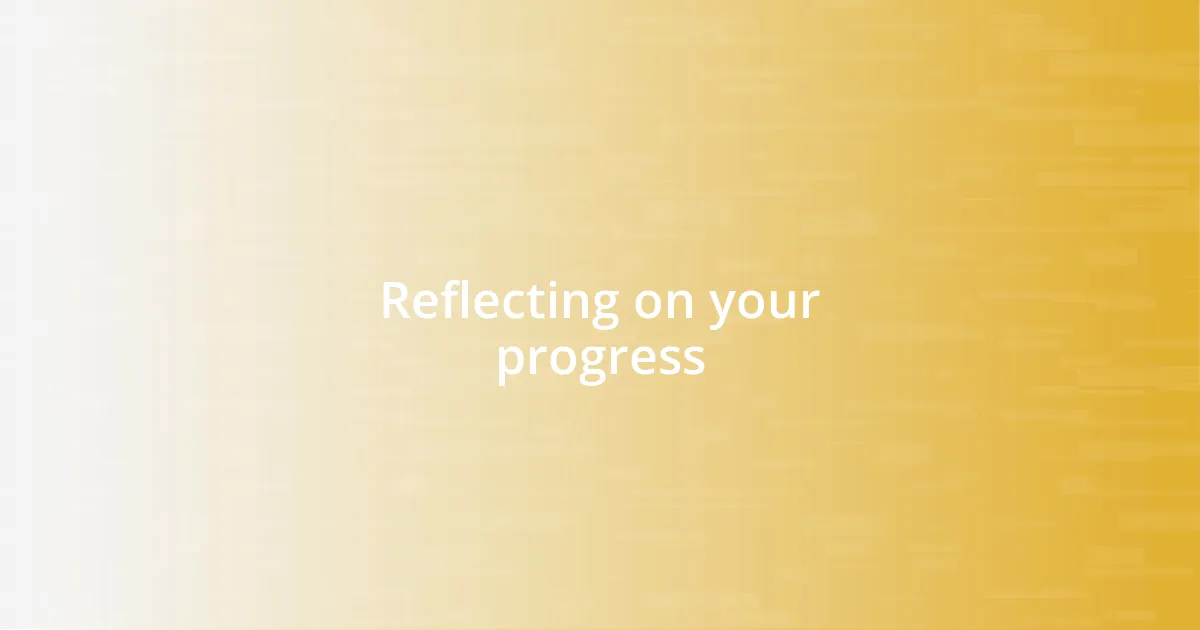
Reflecting on your progress
Reflecting on my progress is an essential practice, especially during the holiday season. I often take a quiet moment at the end of each day to think about my journey—where I started and how far I’ve come. It’s during these reflections that I notice the small victories; they might seem insignificant, but to me, each day without a drink feels like a step towards a brighter future.
One holiday, as I looked back, I realized I had attended several festive gatherings without feeling the urge to drink. In fact, I found myself actually enjoying the moments more deeply, engaging in conversations and creating memories. Have you ever stopped to appreciate how far you’ve traveled on your own path? It’s a rewarding feeling to acknowledge my resilience and growth, and it can be profoundly motivating.
I also find it helpful to celebrate my milestones, no matter how small. Whether it’s treating myself to a nice meal or simply reflecting on my achievements, these acts of self-recognition reinforce my commitment to sobriety. I remember feeling particularly proud when I navigated a holiday party where drinks flowed freely—but I stayed true to my choices. How do you celebrate your progress? Those little celebrations remind me that I’m capable of continuing this path, and they empower me to tackle future challenges with confidence.










